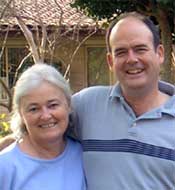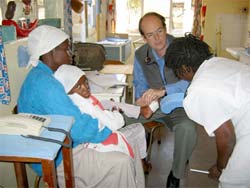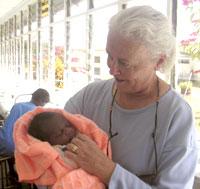New Hope at St. Theresa’s Hospital

There is a blue book in the pediatric ward at St. Theresa’s hospital. It sits on the shelf behind the desk on the ward where I see the in patients and contains death certificates. Each day when I come in to make rounds, I greet the nurses, but my eyes glance toward the desk to see if the blue book is sitting there. If it is, it means that one of the little ones did not survive the night. It is one of those moments where you say a little prayer before you look. Two weeks ago, a Sunday, was one of the several days in a week when the blue book was sitting on the desk. My heart sank a little when I saw the name on the form I was to complete. It was a five year-old child I had admitted a week prior. He was fresh in my memory not only because he was a wonderful little person, but because of the note I wrote when I admitted him.He suffered from HIV/AIDs and had lost a great amount of weight. I found myself absent-mindedly writing a common standard phrase on his admission note indicating that he was “well nourished”. I caught myself in mid-word as I wrote and looked at what I had started to write. For a moment, I had confused what is common with what is normal. There are so many people with weight loss from HIV/AIDs on the inpatient wards (both adults and children).
Many of our patient’s suffer terribly with personal illness and the loss of family members. They suffer quietly and stoically. The burden of HIV/AIDs, tuberculosis, malaria, and other illnesses is hard to imagine. There is a new hope here, however, for the patients suffering with HIV/AIDs. We have just started to give HIV anti-viral medications at St. Theresa’s Hospital. Not a lot of people yet, but we have started. It is a complex task to begin these medications with the cost of the medications, a power supply which is very hard on delicate laboratory equipment, the distances people must travel for care…the list goes on and on. I recall, however, the day the first patient actually walked out of the hospital on these “anti-retroviral” or “ARV” medications. It was as if the world had changed a bit. The hospital looked different and you had the feeling that you were participating in a very important event in medical history. I also recall clearly when the first patient we started on the ARV medications returned to see us for a follow-up visit this week and had gained 16 pounds in one month!. There is now hope both for those who do not have HIV through the education and encouragement provided as well as a new hope for those suffering here with HIV/AIDs. You really get the feeling that the world will look back on this time and place in a hundred years as a part of the turning of the tide in the struggle to control HIV. At a more personal level, it gives us hope that the little blue book will sit up on the shelf more often.
After a long and tiring day that Sunday, I was walking back to our quarters when I saw a group of 5 or 6 high school students pushing another, obviously injured, young man in a wheelbarrow (this particular wheelbarrow is referred to at the St. Joseph’s Mission High School as “the ambulance”). They stopped me to describe how their friend had been injured in a football (i.e. soccer) match. I asked the most important medical question you can ask an injured athlete, “but did you win the match?”. They excitedly began to tell me how they did, indeed, win. As they continued toward the hospital with the injured hero, I watched them as they forgot the injury and excitedly talked about the match. It was so good to be reminded that not all of our patients suffer from HIV/AIDs or tuberculosis. There are babies born, healthy young men and women injured in athletic endeavors, and children to be immunized. Seeing them refreshed me greatly.

I was awakened about midnight last night to be given a slip of paper by the night watchman (and his dog!) which said “Maternity – Cord Prolapse”. This is a serious complication of labor in which the umbilical cord comes down before the baby’s head. I headed down the lane quickly in the dark to find the midwife holding the baby’s head up off of the umbilical cord. The nurse from the men’s ward got the operating room ready while another staff member headed off in the absolute dark on a bicycle (with no headlight!) to get the anesthetist. Someone else runs down to get the operating room technician at her home. God blesses us once again in our work, and the cesarean section goes well. What struck me the most last night was how all of the staff, from the head nurse to the night watchman, wanted only to know what they could do to help. No one asks who is on call, or whose job it is to do what. Everyone just does whatever he or she can for the patients.
Everything at the hospital “tries to stop” on Fridays at 3:00 P.M. There is Mass in a building next to the hospital where patients, their families, and much of the hospital staff gather to celebrate Mass together. There is something quite special about the sight of patients suffering from illnesses and the staff who try to help them gathering together to pray. For a moment, you don’t see patients, nurses, and hospital administrators as such, you just see the community. The sense of fellowship continues to influence the way you see your life and work the rest of the week.

Sheila and I keep the MiSheila Cavanagh holds sick babyssion Doctors Association family in our prayers. We are most thankful for those who also keep us in their prayers, prayers which buoy us up when the going is hard, prayers which make our patients survive and thrive when there is no other real reason they should do so. We are thankful for those who serve the organization through their work as volunteers, who give the real life to the organization through their tireless and joyful efforts. We are grateful to those who work in the medical mission fields along with us. It is a great help when you have those occasional hard days to recall that there are other MDA missioners in other areas of the world who are doing the same work. We feel a camaraderie with and pray for those who are considering medical mission work, having gone through a period of agonizing discernment ourselves. We cannot imagine our lives had we not said “yes” to what we knew God wanted us to do. We lastly thank most sincerely those benefactors who give to support this work. Your steadfast generosity speaks of caring and commitment to those we serve.
God Bless you all,
Timothy & Sheila Cavanagh
